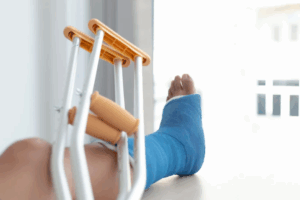Content Reviewed by:
Tucker Clagett •
July.22.2025
Vertified Content
Jul 22, 2025
| Read Time: 4 minutes

Recognizing the signs of common truck accident injuries can help protect your health and rights after a crash in Maryland.
Article Contents
Why Truck Accidents Cause More Severe Injuries
Unlike car accidents, the impact from a semi truck occurs at a higher point on a smaller vehicle, bypassing the bumpers and crumple zones built to absorb contact. Instead, the front or side of the truck may collide directly with windows, doors, or the cabin where passengers sit. The result? An 18-wheeler can crush a vehicle, lift it off the ground, or shove it into another object, which compounds the damage.
Large commercial trucks also take longer to stop, making rear-end collisions more forceful and difficult to avoid. The shape and height of the trailer can cause under-ride impacts that crush the roof or sides of the vehicle, leaving occupants exposed to multiple points of contact in a single crash.
Common Truck Accident Injuries
This violent collision of a truck accident puts tremendous strain on the body, often causing multiple injuries at once. Below are some of the most common injuries we see.
Soft Tissue Injuries
Soft tissue damage is one of the most common truck accident injuries. A collision can stretch or tear muscles, ligaments, and tendons. The neck, shoulders, and back are particularly vulnerable, even when wearing a seatbelt. Your body simply isn’t designed to handle that kind of sudden force.
You may experience:
- Spreading soreness,
- A pulling sensation when moving,
- Stiffness after periods of rest, and
- Persistent aches that won’t fade.
While these may seem minor injuries initially, they often interfere with mobility and daily activities. Without proper treatment, they can become more difficult to manage over time.
Spinal Injuries
Truck crashes can throw the body forward, twist the torso, or compress the spine—sometimes all at once. These movements may damage the vertebrae, strain the supporting muscles, or irritate nearby nerves.
Early symptoms might feel like routine soreness, but can often progress into:
- Pain that radiates down the arms or legs,
- Tingling or numbness on one side of the body, and
- Muscle weakness or limited range of motion.
Spinal injuries can affect balance, coordination, and everyday movement. Diagnostic imaging is often required to confirm the extent of the damage, and depending on the severity, treatment may involve physical therapy, injections, or surgery.
Head Injuries
The brain doesn’t need direct contact to be injured in a truck crash. The force of the collision alone can cause your brain to jolt or shift inside the skull, resulting in a concussion or more severe trauma.
Watch for signs such as:
- Brain fog or confusion,
- Headaches that become more intense over time,
- Sensitivity to light or noise,
- Dizziness or balance problems, and
- Slowed thinking or memory issues.
Many truck accident injuries to the brain are difficult to detect without a proper neurological exam, particularly if you remain conscious after the crash. However, even mild brain trauma can affect sleep, concentration, and day-to-day function.
Facial Injuries
During a truck crash, the face may strike the steering wheel, dashboard, window, or airbag. with enough impact to cause visible trauma. Damage may include:
- Cuts, bruises, or fractures near the eyes, nose, or jaw;
- Swelling that interferes with vision or breathing; and
- Dental trauma or jaw restriction.
Depending on the affected areas, care might include oral surgery, facial reconstruction, or procedures to reduce swelling and restore normal movement.
Internal Injuries
Internal injuries affect organs, blood vessels, or soft tissue without visible signs, making them easy to miss. These “silent” injuries are common in high-impact truck accidents and can be life-threatening.
You might feel fine initially, but symptoms often appear hours or days later. Pay attention to:
- Unexplained fatigue or weakness,
- Pain or pressure in the chest or abdomen,
- Difficulty breathing, or
- A deep ache that worsens over time.
Because these injuries can remain unnoticed at first, they are among the most dangerous to overlook. If not diagnosed and documented promptly, they can also be harder to link to the accident later on.
Fractures
Bones can easily break under the weight and force of a truck collision, whether from a direct blow or the body being thrown against a surface inside the vehicle. Ribs, wrists, hips, and ankles are the most commonly affected areas.
Signs of a fracture may include:
- Swelling or tenderness that lingers;
- Sharp pain with walking, lifting, or twisting; and
- Difficulty breathing or chest pain near the ribs.
Without stabilization, a fractured bone can shift out of alignment and delay recovery. Early imaging and treatment help support healing and lower the risk of long-term joint or mobility issues.
Psychological Impact
Even after the physical truck accident injuries begin to heal, many victims are left feeling anxious, restless, or emotionally numb. You might avoid driving altogether or feel jumpy at everyday sounds and sensations.
You may find yourself:
- Constantly on edge,
- Overwhelmed in traffic or crowded places,
- Struggling to relax or feel safe, or
- Detached from loved ones or daily life.
These are symptoms of emotional trauma, including PTSD (post-traumatic stress disorder). Many survivors experience nightmares, flashbacks, or sudden mood changes that make it hard to work, socialize, commute, or sleep.
Emotional trauma isn’t always recognized right away, but the effects can be just as disruptive, causing real harm to relationships, routines, and quality of life. Treatment and documentation matter, not just for recovery but for showing how the crash continues to affect you.
Injured in a Truck Accident? Reach Out to Southern Maryland Law Today
With over 60 years of experience, Southern Maryland Law is the longest-standing law firm in Waldorf and the second oldest in the entire region. We’ve spent decades advocating for victims of truck accidents, and we know just how life-altering these crashes can be physically, emotionally, and financially.
If you’ve suffered truck accident injuries, you need a firm that will fight for your rights. When you contact us, you’ll speak directly with an experienced truck crash attorney ready to pursue the compensation you deserve. Call Southern Maryland Law today.



